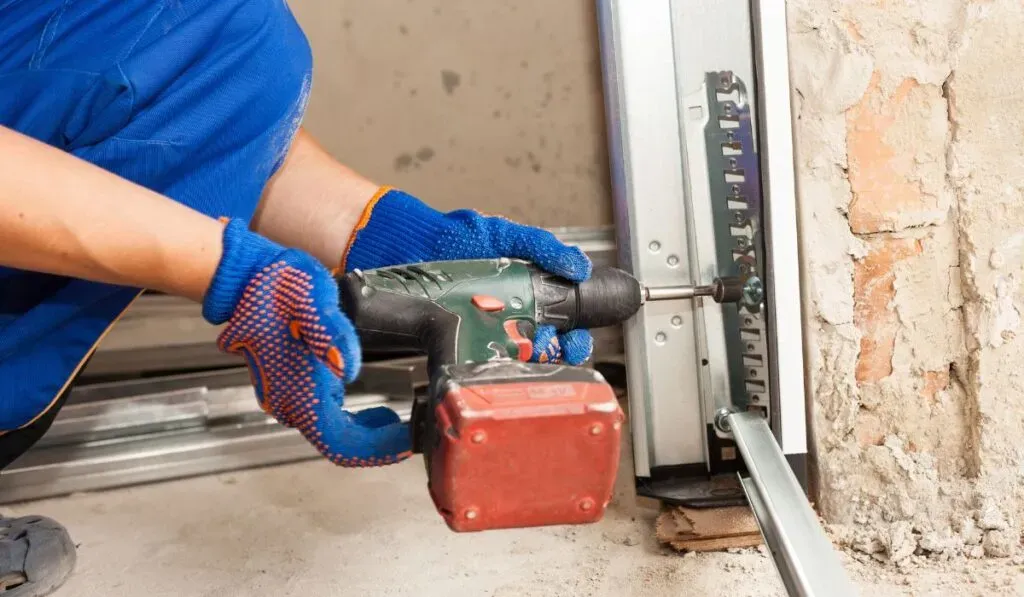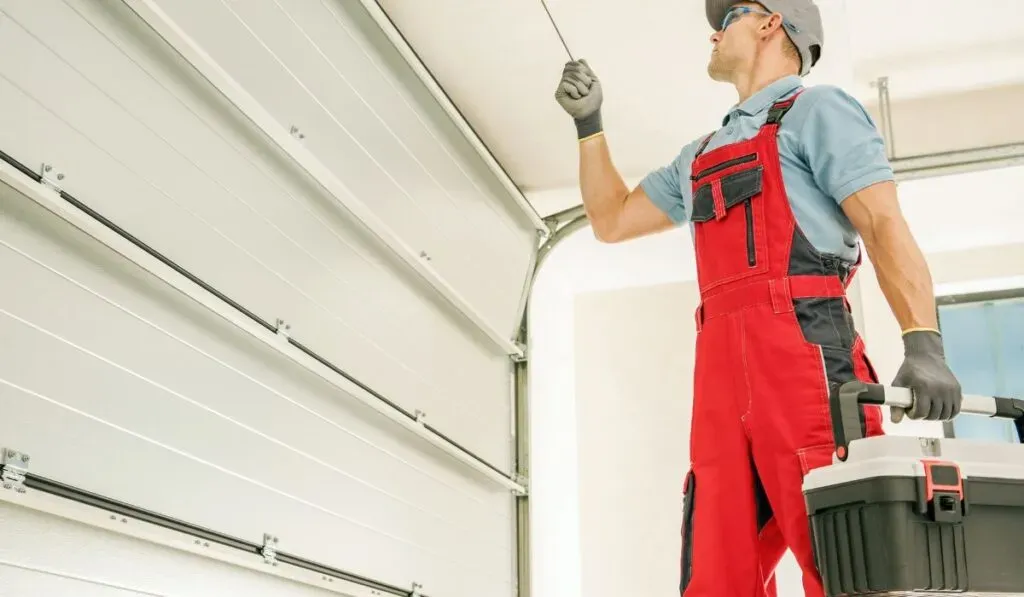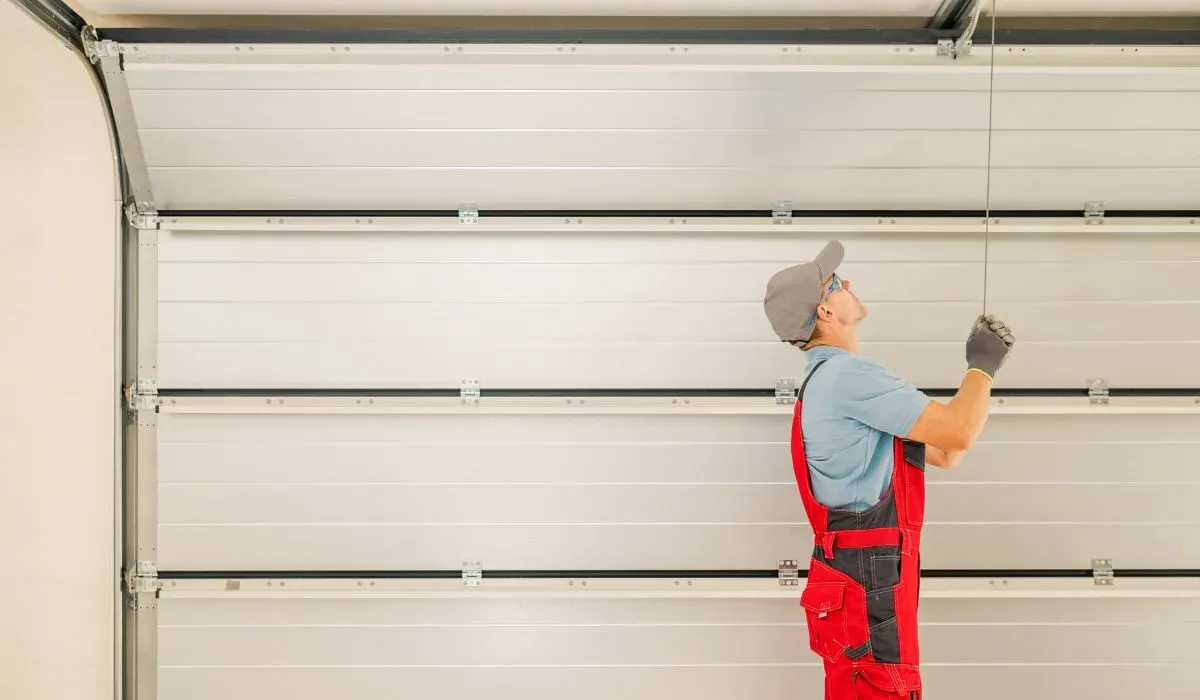A garage door making noise can signal problems like faulty springs, unlubricated nylon or steel rollers, or cable imbalance; identifying the type of sound helps guide proper repairs. With tips on lubricating rollers, spring repair, and when to choose DIY over professional help, Gulliver Garage Doors offers practical advice for quieting your garage door.
Understanding Your Noisy Garage Door
Is your garage door making noise? Well, listen closely to figure out what’s wrong. Different sounds mean different problems. Here’s a quick list:
- Squeaking – That squeaking noise? It might be your hinges or worn rollers needing oil. If the squeaking keeps going, try adding some lubricant.
- Grinding – Grinding sound? That usually means parts like gears or rollers are rubbing the wrong way or are damaged. You should check them soon.
- Rattling – Rattling noise? Loose bolts or fasteners often cause that. Give them a good tightening to stop the rattles.
- Banging – Bang! If your door makes sudden banging sounds, the springs or cables could be off balance. This can be dangerous and needs fixing fast.
- Scraping – If you hear scraping, your door might be rubbing against the track. This usually means the track is misaligned and needs adjusting.
Common Noisy Garage Door Culprits
Lots of things can make your garage door noisy:
- Worn Rollers: Both nylon and steel rollers wear down over time. When they do, they make more noise.
- Loose Fasteners: Screws and bolts get loose and cause rattling sounds.
- Damaged Springs: Broken torsion springs often cause loud bangs.
- Faulty Garage Door Opener: Sometimes the opener itself makes weird noises when it’s not working right.
- Misaligned Tracks: Tracks that don’t line up make doors scrape while moving.
- Unbalanced Garage Door: Doors out of balance put extra stress on parts, making noise.
- Worn Hinges: Old hinges without enough oil can squeak a lot.
Diagnosing the Problem
If your garage door is making noise, it usually means something is off. Different sounds point to different problems. Knowing what each noise means helps you fix things before they get worse. Here’s a quick look at common garage door noises and what they often mean:
- Grinding: This comes from worn rollers or bad gears.
- Squeaking: Happens when hinges or parts need lubrication.
- Rattling: Usually loose fasteners or hardware shaking.
- Banging: Broken springs, cables, or opener problems cause this.
- Scraping: Tracks that don’t line up right cause metal to rub.
Sometimes you’ll hear popping sounds, which often come from springs releasing tension suddenly. Knowing these sounds lets you figure out if you can fix it yourself or need a pro.
Squeaking Noises
Squeaks happen when metal parts rub without enough lubricant. Hinges squeak a lot because they move a ton. Here are some reasons why your garage door might squeak:
- Dry hinges that need oil
- No lubricant on rollers or tracks
- Rust is building up on parts
How to fix squeaking:
- Use a silicone spray made for garage doors—don’t use WD‑40 since it attracts dirt.
- Spray all moving parts every six months to keep things quiet.
- Clean rusty spots before putting on lubricant, so it works better.
If the squeak won’t quit, the hinges might be worn out and need swapping. Keeping your garage door lubricated helps it run smoothly and last longer.
Grinding Noises
Grinding noises mean parts inside are really worn down. Common causes are:
- Rollers that have flat spots or cracks
- Bearings at roller ends that are damaged or loose
- Gears inside the opener are getting messed up
If you hear grinding:
- Look for damaged rollers missing their smooth nylon coating.
- Check if end bearings wiggle too much—they should be tight.
- Have a pro look at the opener gears since fixing them can be risky alone.
Ignoring grinding could break your door totally and cost a lot more later.
Rattling Noises
A rattling noise usually means something’s loose but not broken yet.
Typical trouble spots include:
- Bolts holding tracks that are loose
- Screws are coming out of the panels slowly
- Hardware inside the opener is shaking around
How to stop rattling:
- Tighten screws and bolts on tracks, panels, and opener mounts with the right tools.
- Swap out any stripped screws for ones that fit properly to keep things safe.
- If noise stays, check weather seals—they can flap in the wind sometimes too!
Fixing rattles early stops small stuff from becoming big damage, like warped panels.
Banging Noises
Banging sounds mean something serious went wrong—like springs or cables breaking fast. Main causes are:
- Torsion springs snapping under tension suddenly
- Lift cables fraying or slipping off their drums
- Faulty openers pushing the door unevenly
- Heavy door parts are dropping with a loud clunk
If your garage door bangs loudly, stop using it right away—it’s dangerous! Call someone who knows how to handle springs safely (they hold lots of force). Don’t try to fix this yourself; it can cause injury.
Getting pros to check things fast keeps everyone safe and your door working well again.
Scraping Noises
Scraping happens when metal rubs because the tracks aren’t lined up right or the door isn’t balanced. Common reasons include:
- Bent tracks from bumps or hits
- Rollers are coming off the track due to loose brackets
- Door sides are unbalanced, putting pressure on one track
How to fix scraping noise?
- Look closely at vertical tracks for dents or bends—small bends can be bent back carefully, but big ones need a pro’s help.
- Tighten mounting brackets so tracks stay steady during use
- Test balance by disconnecting the opener, then llifting the door halfway—if one side falls faster, call an expert
Getting tracks aligned stops scraping fast and protects rollers and panels from wearing out too soon.

Lubrication Techniques for a Quieter Garage Door
Lubricating your garage door helps cut down on noise and keeps it working smoothly. To lubricate garage door parts correctly, check the manufacturer’s lubrication guidelines first. They usually say to oil moving parts like rollers, hinges, springs, and tracks.
Use good lubricant types made for garage doors. You can pick lithium-based grease, silicone-based lubricant, or special garage door lubrication oils. These stop friction and wear but don’t attract dust or dirt.
Try to lubricate at least twice a year. If the weather is rough, do it more often. This keeps your garage door quiet and lasts longer.
Choosing the Right Lubricant
Picking the right lubricant makes a big difference in noise and how long parts last. Here are common choices:
- Lithium-Based Grease: Thick and good for metal parts like rollers and hinges; holds up well against water.
- Silicone-Based Lubricant: Comes as a thin spray that reaches small spaces; works well on plastic parts or nylon rollers.
- Garage Door Lubrication Oils: Light oils fit for springs and cables.
Avoid WD-40 or normal household oils—they attract grime or wear out fast. Always follow your garage door manufacturer’s lubrication guidelines before buying.
Roller Replacement
Garage door rollers come in two main types: nylon rollers and steel rollers. Each acts differently with noise and strength.
Nylon Rollers
- They have nylon wheels with steel ball bearings inside:
- Quiet because of the soft material
- Need less lubrication
- Resists rust better than steel
- Good if you want silent operation
Steel Rollers
- Made all from metal:
- Tougher under heavy use
- Noisier from metal rubbing on metal
- Cheaper but needs more care
Pick nylon or steel based on what matters more—quietness or strength—and what fits your budget.
Installation Instructions
To replace worn rollers:
- Turn off the power if an automatic opener is there.
- Clamp the door open below the bottom roller bracket so it doesn’t move.
- Loosen bolts holding old roller (check hardware tightening tips below).
- Put the new roller into the track carefully to avoid damage.
- Tighten brackets but not too tight; don’t stop movement.
- Move the door by hand to check smooth rolling before turning the power back on.
If you’re not sure about safety—especially with spring tension—get help from a pro instead of risking injury.
When to Call a Professional
Knowing when to call for garage door repair helps you avoid trouble and saves money. Some small problems you can fix yourself. But many issues need a professional garage door technician. They bring experience and know how to fix things right. Getting professional garage door servicing means you get reliable service that keeps your home safe.
Recognizing When DIY Isn’t Enough
DIY repairs may seem easy, but there are limits. Trying to fix complex problems without skills or tools can cause safety concerns.
Here are some tricky repairs you should not do yourself:
- Broken springs or cables are dangerous because they hold a lot of tension.
- Misaligned tracks need careful adjustments that go beyond simple fixes.
- Electrical parts in openers need special knowledge.
If your door makes weird noises, moves unevenly, or looks damaged, stop trying DIY. Call for professional garage door repair. Ignoring these signs might lead to costly repairs or even injury.
When Professional Help is Essential
Some problems always need expert hands because they involve risky parts of electrical systems:
- Broken torsion spring: These springs store strong energy and can hurt badly if mishandled.
- Broken springs: Both torsion and extension springs must be fixed by trained technicians only.
- Damaged cables: Frayed or snapped cables make the door unsafe and unbalanced.
- Significant misalignment: Doors off track, wear out rollers and motors faster; professionals have the right tools to fix this.
Professional garage door technicians follow strict safety rules, especially during emergency garage door repair. Their skill lowers risks and gets your door working smoothly and fast.
Understanding the Costs of Repair vs. Replacement
Garage door repair costs change based on how bad the problem is. Knowing when repairs get too pricey helps you decide what to do.
When repair costs climb high, replacing an old door might save money over time—especially if many parts break often. A professional check helps you choose if repairing or replacing is the best fit.
Good professionals offer clear pricing with no hidden fees. Emergency garage door repair might cost more, but it gets quick results when you need it most.

Garage Doors Maintenance Tips
At Gulliver Garage Doors, we share some easy tips for taking care of your garage door:
- Lubricate all moving parts with good lithium-based grease or silicone spray made for garage doors.
- Don’t put on too much lubricant; extra stuff can catch dirt and wear parts faster.
- Tighten all nuts, bolts, and screws you see at least twice a year to keep everything snug.
- Look closely at rollers; nylon rollers are quieter than steel but still need lube.
- Follow the exact lubrication spots in your owner’s manual, like spring coils and end bearings.
- Keep a written garage door maintenance schedule so you don’t forget anything throughout the year.
Stick to these tips from Gulliver Garage Doors pros. Your door will run smoothly and stop making weird sounds from worn parts or loose fittings.
If your door acts strangely even with care, call our service team fast. They help before small problems get big and costly.
Scheduling Garage Door Service with Us!
If your garage door starts making noise, don’t wait. Getting professional garage door repair soon can stop small problems from turning big. Gulliver Garage Doors has experienced technicians who give reliable service. They know how annoying squeaky hinges or grinding sounds can be. Their professional garage door servicing keeps your door running smoothly and quietly.
Sometimes, problems happen fast, and you need help right away. Gulliver offers emergency garage door repair for those sudden issues that mess with safety or block your access. Their skilled techs take quick action to fix things before damage grows worse. Plus, regular tune-ups help your door work quietly and last longer.
- Fix noisy doors before they get worse
- Trust experienced technicians for reliable service
- Use emergency garage door repair when needed fast
- Keep your door smooth with regular servicing
Frequently Asked Questions
What causes garage door popping sounds?
Popping sounds often come from springs releasing tension suddenly. It can also signal worn rollers or cable imbalance.
How do I know if my garage door springs are broken?
Broken torsion springs cause a loud banging noise, and the door may not open properly. Check for sudden clunks or snapping sounds.
Why is my garage door opener making noise?
Garage door opener noise can stem from worn gears, loose hardware, or motor problems in chain-drive, belt-drive, or screw-drive openers.
How to tighten garage door hardware properly?
Use the correct wrench or socket for bolts. Tighten until firm, but avoid over-tightening. Follow torque specifications if available.
When should I replace garage door rollers?
Replace rollers when they show cracks, flat spots, or cause grinding noise. Nylon rollers reduce noise better than steel.

